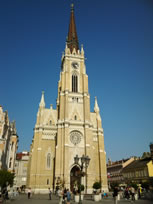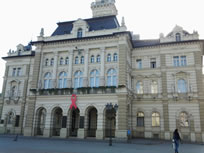
Yesterday morning I met up with other conference participants and after a bit of a wander around the city, we had lunch then went to the opening ceremony a reception. In the after we had a little guided tour of Novi Sad seeing some interesting buildings, including the Catholic or Orthodox Cathedrals, and the fortress. There are some rather attractive buildings here, wide, pedestrianised café-lined streets, some nice parks and generally a relaxed kind of atmosphere.
In the evening we all went to a restaurant about 4 or 5km from the city centre for dinner. I walked there with a few others, and the rest went by bus or taxi. We had a nice dinner with lots of polyglot chat, then some people started dancing, and others carried on chatting.

Today there were lectures and talks on a variety of topics including sound symbolism, the magic of metaphors, language coaching, and acting and humour in a foreign language.
So far I’ve had conversations in about 10 languages and spoken bits and pieces of maybe 10 others. In some cases this was only a few words (all I know), in others it was a bit more. There are even two guys here who are learning Scottish Gaelic, one of whom also speaks a bit of Manx, and another who is learning Irish.
